Tachycardia
Medically reviewed by Drugs.com. Last updated on Dec 15, 2023.
Overview
Tachycardia (tak-ih-KAHR-dee-uh) is the medical term for a heart rate over 100 beats a minute. Many types of irregular heart rhythms, called arrhythmias, can cause tachycardia.
A fast heart rate isn't always a concern. For instance, the heart rate usually rises during exercise or as a response to stress.
Tachycardia may not cause any symptoms or complications. But sometimes it's a warning of a medical condition that needs attention. Some forms of tachycardia can lead to serious health problems if left untreated. Such problems may include heart failure, stroke or sudden cardiac death.
Treatment for tachycardia may include specific actions or movements, medicine, cardioversion, or surgery to control a rapid heartbeat.
Types
There are many different types of tachycardia. Sinus tachycardia refers to a usual increase in the heart rate often caused by exercise or stress.
Other types of tachycardia are grouped according to cause and the part of the heart causing the fast heart rate. Common types of tachycardia caused by irregular heart rhythms include:
- Atrial fibrillation, also called AFib. This is the most common type of tachycardia. Chaotic, irregular electrical signals start in the upper chambers of the heart, called the atria. These signals trigger a fast heartbeat. A-fib may be temporary. But some episodes won't end unless treated.
- Atrial flutter. Atrial flutter is similar to A-fib, but heartbeats are more organized. Episodes of atrial flutter may go away by themselves or may need treatment. People who have atrial flutter also often have A-fib at other times.
- Ventricular tachycardia. This irregular heart rhythm starts in the lower heart chambers, called the ventricles. The fast heart rate doesn't let the ventricles fill and squeeze to pump enough blood to the body. Episodes may be brief and last only a couple of seconds without causing harm. But episodes lasting more than a few seconds can be life-threatening.
- Supraventricular tachycardia (SVT). Supraventricular tachycardia is a broad term that includes irregular heart rhythms that start above the lower heart chambers. Supraventricular tachycardia causes episodes of a pounding heartbeat that begin and end abruptly.
- Ventricular fibrillation. This serious condition can be deadly if the heart rhythm isn't reset within minutes. Rapid, chaotic electrical signals cause the lower heart chambers to quiver instead of squeezing in a coordinated way. Most people with this type of irregular heart rhythm have heart disease or have had a serious injury, such as being struck by lightning.
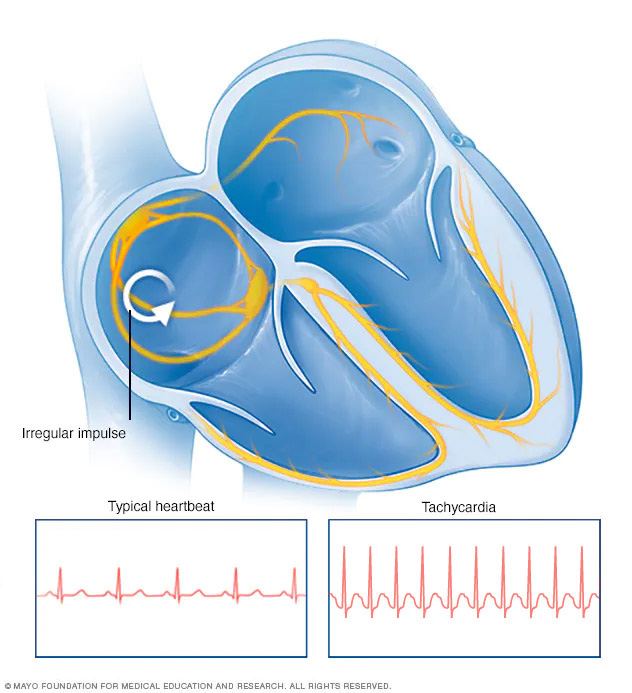
In tachycardia, an irregular electrical signal, called an impulse, starts in the upper or lower chambers of the heart. This causes the heart to beat faster.
Symptoms
Some people with tachycardia have no symptoms. The fast heartbeat may be discovered when a physical exam or heart tests are done for another reason.
In general, tachycardia may cause these symptoms:
- Racing, pounding heartbeat or flopping in the chest, called palpitations.
- Chest pain.
- Fainting.
- Lightheadedness.
- Rapid pulse.
- Shortness of breath.
When to see a doctor
Many things can cause tachycardia. If you feel like your heart is beating too fast, make an appointment for a health checkup.
Seek immediate medical help if you have:
- Chest pain or discomfort.
- Shortness of breath.
- Weakness.
- Dizziness or lightheadedness.
- Fainting or near fainting.
A type of tachycardia called ventricular fibrillation is an emergency that requires immediate medical attention.
During ventricular fibrillation, blood pressure drops dramatically. The person's breathing and pulse stop because the heart is not pumping any blood to the body. This also is called cardiac arrest. The person usually falls down, also called collapses.
If this happens, do the following:
- Call 911 or the emergency number in your area.
- Start CPR. CPR helps keep blood flowing to the organs until other treatments can start.
- If you're not trained in CPR or worried about giving rescue breaths, then provide hands-only CPR. Push hard and fast on the center of the chest at a rate of 100 to 120 compressions a minute until paramedics arrive. The American Heart Association suggests doing compressions to the beat of the song "Stayin' Alive." You don't need to do rescue breathing.
- Have someone get an automated external defibrillator (AED) if one is nearby. An AED is a portable device that delivers a shock to reset the heart rhythm. No training is needed to use the device. The AED tells you what to do. It's programmed to give a shock only when appropriate.
Causes
Tachycardia is an increased heart rate for any reason. If a fast heart rate is caused by exercise or stress, it's called sinus tachycardia. Sinus tachycardia is a symptom, not a condition.
Most heart conditions can lead to different forms of tachycardia. Irregular heart rhythms, called arrhythmias, are one cause. An example of an irregular heart rhythm is atrial fibrillation (AFib).
Other things that may lead to tachycardia include:
- Fever.
- Excessive alcohol use, which is defined as 14 or more drinks a week for a man or seven or more drinks a week for a woman.
- Alcohol withdrawal.
- Too much caffeine.
- High or low blood pressure.
- Changes in the level of minerals in the body, called electrolytes. Examples include potassium, sodium, calcium and magnesium.
- Certain medicines.
- Overactive thyroid, called hyperthyroidism.
- A low number of red blood cells, called anemia.
- Smoking or nicotine use.
- Use of illegal stimulants such as cocaine or methamphetamine.
- Heart attack.
Sometimes the exact cause of tachycardia is not known.
How does the heart beat?
To understand the cause of tachycardia, it may be helpful to know how the heart usually works.
The heart has four chambers:
- The two upper chambers are called the atria.
- The two lower chambers are called the ventricles.
Inside the upper right heart chamber is a group of cells called the sinus node. The sinus node makes the signals that start each heartbeat.
The signals move across the upper heart chambers. Then the signals arrive at a group of cells called the AV node, where they usually slow down. The signals then go to the lower heart chambers.
In a healthy heart, this signaling process usually goes smoothly. The resting heart rate is typically 60 to 100 beats a minute. But in tachycardia, something causes the heart to beat faster than 100 beats a minute.
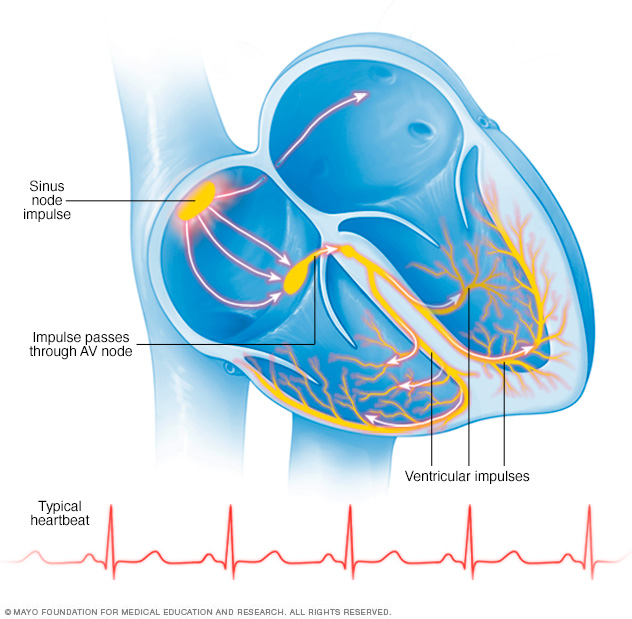
In a typical heart rhythm, a tiny cluster of cells at the sinus node sends out an electrical signal. The signal then travels through the atria to the atrioventricular (AV) node and then passes into the ventricles, causing them to contract and pump out blood.
Risk factors
In general, things that may raise the risk of irregular heart rhythms that commonly cause tachycardia include:
- Getting older.
- Having a family history of some heart rhythm disorders.
- High blood pressure.
Lifestyle changes or treatment of heart conditions may lower the risk of tachycardia.
Complications
When the heart beats too fast, it may not pump enough blood to the body. As a result, the organs and tissues may not get enough oxygen.
Complications of tachycardia depend on:
- The type of tachycardia.
- How fast the heart is beating.
- How long the rapid heart rate lasts.
- Whether there are other heart conditions.
Potential complications of tachycardia may include:
- Blood clots that can cause a heart attack or stroke. Blood-thinning medicine may be used to lower this risk.
- Frequent fainting or unconsciousness.
- Heart failure.
- Sudden cardiac death. This is usually only associated with ventricular tachycardia or ventricular fibrillation.
Prevention
The best way to prevent tachycardia is to keep the heart healthy. Have regular health checkups. If you have heart disease, follow your treatment plan. Take all medicines as directed.
Try these tips to prevent heart disease and keep the heart healthy:
- Don't smoke.
- Eat a diet that's low in salt and saturated fat.
- Exercise at least 30 minutes a day on most days of the week.
- Maintain a healthy weight.
- Reduce and manage stress.
- Control high blood pressure, high cholesterol and diabetes.
- Get good sleep. Adults should aim for 7 to 9 hours daily.
Talk to your healthcare team before using any medicines. Some cold and cough medicines have stimulants that may start a rapid heartbeat. Illegal drugs such as cocaine and methamphetamine are other stimulants that can cause changes in the heart's rhythm.
Diagnosis
To diagnose tachycardia, a healthcare professional examines you and asks questions about your symptoms, health habits and medical history.
Tests
Tests may be done to confirm an unusually fast heartbeat and to look for the cause. Tests to diagnose tachycardia may include:
-
Electrocardiogram (ECG or EKG). This quick test checks the heartbeat. Sticky patches, called electrodes, are attached to the chest and sometimes to the arms or legs. An ECG shows how fast or how slow the heart is beating.
Some personal devices, such as smartwatches, can do ECGs. Ask your care team if this is an option for you.
- Holter monitor. This portable ECG device is worn for a day or more to record the heart's activity during daily activities. This test can detect irregular heartbeats that aren't found during a regular ECG exam.
- Event monitor. This device is like a Holter monitor, but it records only at certain times for a few minutes at a time. It's typically worn for about 30 days. You usually push a button when you feel symptoms. Some devices automatically record when an irregular heart rhythm is noticed.
- Echocardiogram. Sound waves are used to create images of the beating heart. This test can show how blood flows through the heart and heart valves.
- Chest X-ray. A chest X-ray shows the condition of the heart and lungs.
- MRI scan of the heart. Also called a cardiac MRI, this test uses magnetic fields and radio waves to create detailed images of the heart. It's most often done to find a cause of ventricular tachycardia or ventricular fibrillation.
- CT scan of the heart. Also called a cardiac CT, this test takes several X-ray images to provide a more detailed look of the heart. It may be done to find the cause of ventricular tachycardia.
- Coronary angiogram. A coronary angiogram is done to check for blocked or narrowed blood vessels in the heart. It uses a dye and special X-rays to show the inside of the coronary arteries. The test may be done to look at the heart's blood supply in people who have ventricular tachycardia or ventricular fibrillation.
-
Electrophysiological (EP) study. This test may be done to confirm a diagnosis of tachycardia. It can help find where in the heart the incorrect signaling occurs. An EP study is mostly used to diagnose some specific types of tachycardias and irregular heartbeats.
During this test, one or more flexible tubes are guided through a blood vessel, usually in the groin, to various areas in the heart. Sensors on the tips of the tubes record the heart's electrical signals.
- Stress tests. Exercise can trigger or worsen some types of tachycardia. Stress tests are done to see how exercise affects the heart. They often involve walking on a treadmill or pedaling a stationary bike while the heart is checked. If you can't exercise, you may be given medicine that increases the heart rate like exercise does. Sometimes an echocardiogram is done during a stress test.
- Tilt table test. This test may be done to learn if a fast heartbeat leads to fainting. The heart rate and rhythm and blood pressure are checked while you lie flat on a table. Then, under careful supervision, the table is tilted to a standing position. A member of your care team watches how your heart and the nervous system that controls it respond to the changes in position.
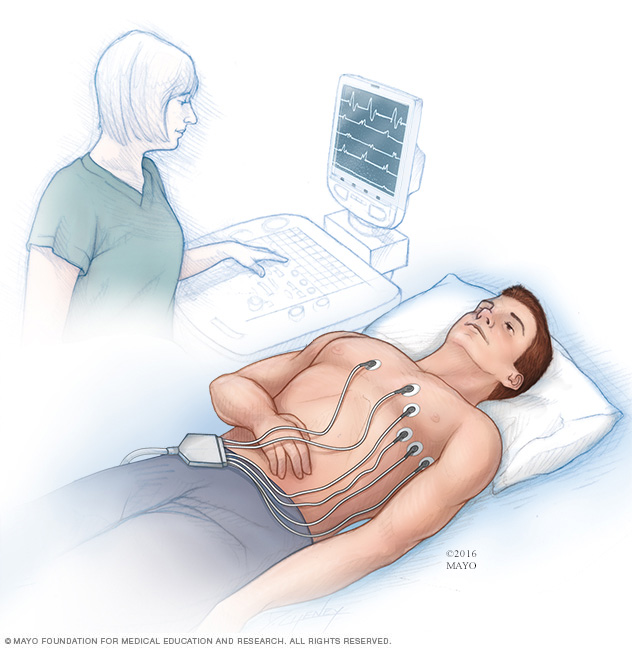
An electrocardiogram (ECG or EKG) is a simple test to determine how the heart is beating. Sensors, called electrodes, are placed on the chest to record the heart's electrical signals. The signals are shown as waves on an attached computer monitor or printer.
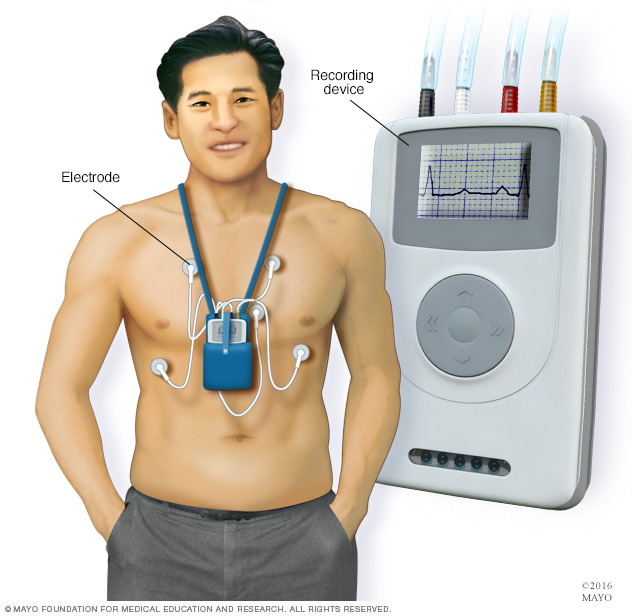
A Holter monitor is a small, wearable device that continuously checks the heartbeat. It uses one or more sensors called electrodes and a recording device to measure the heart's activity. The device is typically worn for a day or more during daily activities.
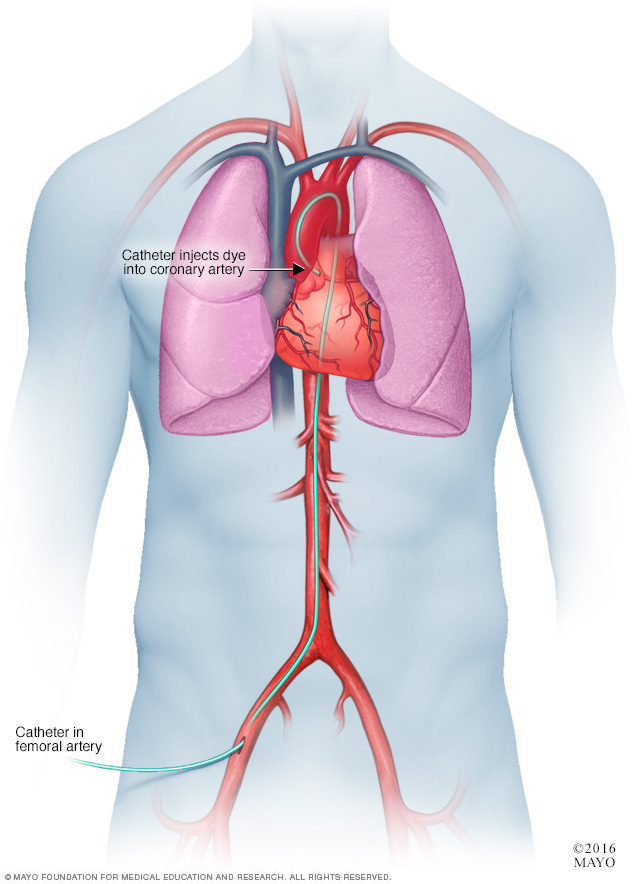
In a coronary angiogram, a flexible tube called a catheter is inserted into an artery, usually in the groin, arm or neck. It's guided to the heart. A coronary angiogram can show blocked or narrowed blood vessels in the heart.
Treatment
The goals of tachycardia treatment are to slow a rapid heartbeat and to prevent future episodes of a fast heart rate.
If another health condition is causing tachycardia, treating the underlying problem may reduce or prevent episodes of a fast heartbeat.
Slowing a fast heart rate
A fast heart rate may correct itself. But sometimes medicine or other treatments are needed to slow down the heartbeat.
Ways to slow a fast heart rate include:
- Vagal maneuvers. Simple but specific actions such as coughing, bearing down as if passing stool or putting an ice pack on the face can help slow down the heart rate. Your healthcare team may ask you to do these specific actions during an episode of a fast heartbeat. The actions affect the vagus nerve. That nerve helps control the heartbeat.
- Medicines. If vagal maneuvers don't stop the fast heartbeat, medicine may be needed to correct the heart rhythm.
- Cardioversion. Paddles or patches on the chest are used to electrically shock the heart and reset the heart rhythm. Cardioversion is generally used when emergency care is needed or when vagal maneuvers and medicines don't work. It's also possible to do cardioversion with medicines.
Preventing future episodes of a fast heart rate
Tachycardia treatment involves taking steps to prevent the heart from beating too fast. This may involve medicines, implanted devices, or heart surgeries or procedures.
- Medicines. Medicines are often used to control the heart rate.
-
Catheter ablation. In this procedure, the doctor inserts thin, flexible tubes called catheters through a blood vessel, usually in the groin. Sensors on the tip of the catheters use heat or cold energy to create tiny scars in the heart. The scars block irregular electrical signals. This helps restore a typical heartbeat.
Catheter ablation doesn't require surgery to reach the heart, but it may be done at the same time as other heart surgeries.
- Pacemaker. A pacemaker is a small device that's surgically placed under the skin in the chest area. When the device senses an irregular heartbeat, it sends an electrical pulse that helps correct the heart's rhythm.
- Implantable cardioverter-defibrillator (ICD). This battery-powered device is placed under the skin near the collarbone. It continuously checks the heart rhythm. If the device detects an irregular heartbeat, it sends out low- or high-energy shocks to reset the heart's rhythm. A healthcare professional may recommend this device if you're at high risk of developing ventricular tachycardia or ventricular fibrillation.
- Maze procedure. A surgeon makes tiny cuts in the upper chambers of the heart to create a pattern of scar tissue. The pattern is called a maze. The heart's signals can't pass through scar tissue. So the maze can block stray electrical heart signals that cause some types of tachycardia.
- Surgery. Sometimes open-heart surgery is needed to destroy an extra electrical pathway causing tachycardia. Surgery is usually done only when other treatment options don't work or when surgery is needed to treat another heart condition.
Lifestyle and home remedies
If you have tachycardia or any type of heart disease, it's important to take steps to keep your heart healthy. Steps include lifestyle changes such as eating a heart-healthy diet, getting regular exercise, and not smoking or using tobacco. Your care team also may suggest that you limit or avoid caffeine.
Alternative medicine
Stress-relief techniques, such as meditation and yoga, might help slow the heartbeat. This can reduce tachycardia symptoms.
Coping and support
If you have a plan to manage an episode of a fast heartbeat, you may feel calmer and more in control when one occurs. Ask your care team:
- How to take your pulse and what heart rate is best for you.
- When and how to do treatments called vagal maneuvers, if appropriate.
- When to seek emergency care.
Preparing for an appointment
If you have tachycardia, you may see a doctor trained in heart conditions. This type of healthcare professional is called a cardiologist. You also might see a doctor trained in heart rhythm disorders, called an electrophysiologist.
There's often a lot to discuss at a health checkup. It's a good idea to be prepared for your appointment. Here's some information to help you get ready.
What you can do
Make a list ahead of time that you can share with your healthcare team. Your list should include:
- Any symptoms, including those that may seem unrelated to your heart.
- Important personal information, including any major stresses or recent life changes.
- All medicines that you take. Include vitamins, supplements and medicines bought with or without a prescription. Also include the dosages.
- Questions to ask your care team.
Basic questions to ask your healthcare professional include:
- What is the likely cause of my fast heart rate?
- What kinds of tests do I need?
- What's the most appropriate treatment?
- What are the risks of my heart condition?
- How do we check my heart?
- How often do I need follow-up appointments?
- How will other conditions I have or medicines I take affect my heart condition?
- Do I need to avoid or stop doing any activities?
- Are there any brochures or other printed material that I can take home with me? What websites do you recommend?
Don't hesitate to ask additional questions.
What to expect from your doctor
Your healthcare team is likely to ask you many questions. Being ready to answer them may save time to go over any details you want to spend more time on. Your care team may ask:
- When did the symptoms start?
- How often do you have episodes of a fast heartbeat?
- How long do they last?
- Does anything, such as exercise, stress or caffeine, make your symptoms worse?
- Does anyone in your family have heart disease or a history of irregular heart rhythms?
- Has anyone in your family had cardiac arrest or died suddenly?
- Do you smoke or have you ever smoked?
- How much alcohol or caffeine do you use, if any?
- What medicines do you take?
- Do you have any conditions that may affect your heart health? For example, are you being treated for high blood pressure or high cholesterol?
© 1998-2024 Mayo Foundation for Medical Education and Research (MFMER). All rights reserved. Terms of use.
